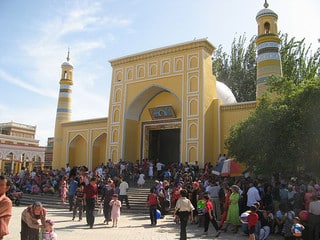Enveloped in a jaundiced haze and sprawling Levittowns of storehouses, Yiwu, Zhejiang Province, China’s “small commodities capital,” is a monument to China’s export-oriented glory. But Yiwu, a paragon of capitalism at the heart of the world’s emblematic atheist country, is not the spiritual vacuum that one might imagine.
“As long as I cover my head, I will live in Yiwu,” Fatima, a Jiangsu native, declared after a Qur’anic night course at the Yiwu Muslim Youth Activities Center.
Yiwu’s palatial grand mosque, a Las Vegas-worthy imitation of Ottoman grandeur, opened its doors in July. Hewn of Turkish marble and Afghan jade, the architectural anomaly offers a welcoming, if confusing, reprieve from the utilitarian aesthetic of the rest of the city.
As one Chamber of Commerce official put it when I first witnessed Yiwu’s Friday juma prayer in November, “there is Mecca, there is Medina, and there is Yiwu.”
Indeed, Yiwu is one of the globe’s few communities with representation from all corners of the Muslim world, a demographic heavyweight thirsty for cheap commodities. Sectarian and ethnic conflicts are temporarily ignored as Kurds and Turks, Sunnis and Shiites, Ethiopians and Eritreans shuffle into the grand mosque.
After the foundation of the People’s Republic in 1949, China’s Muslims were cut off from the global Islamic community. Today, progressive openness exposes some of China’s roughly 30 million Muslims (a conservative estimate) to their foreign coreligionists. Yiwu is a hub of this newfound phenomenon.
The unique kaleidoscope of Yiwu’s Friday prayer offers a humbling testament to the transnational power of Islam.
Besides, as the Chamber of Commerce gentleman declared, “Yiwu is the only city in China where you can trust that halal restaurants are actually halal.”
Finding Yiwu’s Islamic Pulse
Outside of often-vacant officially condoned houses of worship, encountering religion in China demands on-the-ground patience.
It was only at the end of my first Yiwu visit that I learned, after lunch with a Chinese convert, about the diffuse nature of the city’s Islamic heartbeat.
With me in tow, the gentleman scurried through an ocean of warehouses and into a prosaic prayer room above a salon, marked by a discrete Arabic sign—just one node in a network of about 15 “underground” mosques in the city, each of which is staffed by a full-time Chinese or foreign imam.
As Dawood, a beaming recent college graduate from Shandong who works for an Arab-managed export agency summarized, Yiwu is the best place to be a Muslim in China precisely because of this convenience. It is always acceptable and easy to stop working and set out for a nearby mosque to pray.
Try explaining that to your atheist boss in mosque-deprived Beijing or Shanghai.
Yiwu’s Disillusioned Faithful: Arabs in China, China in Arabs
But for more discerning Muslims, the Yiwu craze is a transient honeymoon phase.
Abu is an Anhui native who converted to Islam over twenty years ago and studied at a madrassa in Aleppo, Syria.
Since most of his regular clients are from Libya, Abu’s fledgling export business faces the likely prospect of closure. Perhaps it is this sense of economic uncertainty that has driven Abu to espouse pessimism regarding the state of Islam in the city.
In our conversations, he emphasized the tendency of Yiwu’s Chinese Muslims to xuehuai (“learn incorrectly”) from the drinking, smoking and cheating foreign Muslims who pray and work with them.
He also lamented the offensive Arab superiority complex, an attitude that prompted one of his Libyan clients to declare that Chinese people should not chant the Qur’an—that should be reserved for Arabs.
When delivering the Qur’an to Muhammad, Abu explained, Allah knew that he was revealing his final word to the world’s most innately savage, morally bankrupt (yeman, mei daode) ethnicity.
If a Chinese Islamic renaissance were to start in Yiwu, it would certainly not be because of the city’s depraved and self-righteous foreigners, Abu argued.
Many of Yiwu’s Chinese Muslims, however, would disagree with Abu’s argument a priori.
After three years at the famed Al Azhar University in Cairo, Ali, a Muslim by birth from Gansu, proceeded directly to Yiwu to find translation work.
When we met in January, Ali had been job searching for a month. On the brink of personal financial collapse and ostensibly nostalgic for his time in Cairo, Ali demonized the religious degradation of Yiwu.
The moral depravity of Yiwu’s profit-oriented, smoking, drinking and partying foreign Muslims featured prominently in his discursive offensive. But unlike Abu, who pointed to the unjustified superiority complex and “innate savagery” of Yiwu’s Arabs, Ali blamed China.
Once foreign Muslims end up in Yiwu, Ali argued, they are tempted by the quintessentially Chinese moral degradation that lines the streets. As is the case in any Chinese manufacturing boomtown, Yiwu is stuffed with massage parlors, bars and more massage parlors.
Certainly, he posited, Arabs are good Muslims at home. After all, Mohammad’s descendants are Arabs. Arabs only act as they do in Yiwu because the atheistic vices of modern urban China get under their skin.
Ali’s only regret is not having found a means to remain in Egypt. Instead, he finds himself penniless and disenchanted in China’s Islamic Las Vegas.


